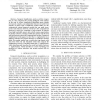Free Online Productivity Tools
i2Speak
i2Symbol
i2OCR
iTex2Img
iWeb2Print
iWeb2Shot
i2Type
iPdf2Split
iPdf2Merge
i2Bopomofo
i2Arabic
i2Style
i2Image
i2PDF
iLatex2Rtf
Sci2ools
105
click to vote
IROS
2007
IEEE
2007
IEEE
Feature selection in conditional random fields for activity recognition
Abstract— Temporal classification, such as activity recognition, is a key component for creating intelligent robot systems. In the case of robots, classification algorithms must robustly incorporate complex, non-independent features extracted from streams of sensor data. Conditional random fields are discriminatively trained temporal models that can easily incorporate such features. However, robots have few computational resources to spare for computing a large number of features from high bandwidth sensor data, which creates opportunities for feature selection. Creating models that contain only the most relevant features reduces the computational burden of temporal classification. In this paper, we show that 1 regularization is an effective technique for feature selection in conditional random fields. We present results from a multi-robot tag domain with data from both real and simulated robots that compare the classification accuracy of models trained with 1 regularization, w...
Related Content
| Added | 03 Jun 2010 |
| Updated | 03 Jun 2010 |
| Type | Conference |
| Year | 2007 |
| Where | IROS |
| Authors | Douglas L. Vail, John D. Lafferty, Manuela M. Veloso |
Comments (0)

